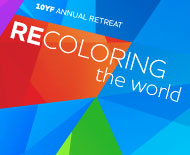Future Now
The IFTF Blog
From #10YF2014: Paying It Forward
 Experiments with new models of value exchange are often dismissed as quirky. Think: Ithaca hours, a timebanking initiative in which an hour of your time functions as a new form of currency. Or Panera’s Pay-what-you-want turkey chili, an offering that the company had to end up suspending in 2013. But new decision science research suggests that we might finally be zeroing in on the alternative economy models that will be more deeply transformative; call it a Pay-It-Forward Currency.
Experiments with new models of value exchange are often dismissed as quirky. Think: Ithaca hours, a timebanking initiative in which an hour of your time functions as a new form of currency. Or Panera’s Pay-what-you-want turkey chili, an offering that the company had to end up suspending in 2013. But new decision science research suggests that we might finally be zeroing in on the alternative economy models that will be more deeply transformative; call it a Pay-It-Forward Currency.
The 2014 Ten-Year Forecast Annual Retreat explored the landscape of change over the next decade by inviting attendees to contemplate ten projects that—if successfully undertaken today—could change the paradigm in their fields in the next ten years. These bold projects are already taking shape in the dark underside of the internet, in the foundations of our global cities, in the building blocks of our economies, and in the microbes of our bodies and our planet. They are rapidly recoloring our world.
During this retreat on May 1-2, 2014, Rachel Hatch explored future economies of interaction, thinking ten years out:
The question becomes: what would it take for quirky, pay-it-forward prototypes to go from novelties to tools so commonplace that they function as the infrastructure for a new currency?
Three drivers of change are primed to accelerate this future:
- Stories of kindness become more compelling, as mobile social tools for tracking them become increasingly inexpensive, lightweight, wearable, and shareable. For example, consider Socialcoin, a web-connected currency that can be passed from hand to hand to track acts of kindness. As discrete acts of kindness leave digital trails, we will start to use visualization tools to track complex chains of network behavior.
- Social contagion research shows that kindness is subject to network effects. In 2010, Christakis and Fowler provided the first laboratory evidence that cooperative behavior and acts of kindness are contagious and spread from person to person in a social network.
- And decision science from a 2013 UC Berkeley/UC San Diego study found that customers actually pay more when given an option to pay-it-forward rather than paying what they think something is worth.
As this future starts to manifest, new tensions will arise:
- Kindness as a Reputation Metric: Just as we measure social reach today, we might measure kindness reach tomorrow. We might expect the Klout of 2024 to include a kindness score. Kindness to become a new measure of citizenship or even kindness metrics might even appear on job-seekers’ resumes. But what if kindness becomes a form of competition? Is it even altruism if it’s tracked?
- Kindness Profiling: Acts of kindness may well become traceable and tradeable. The increased visibility that amplifies a culture of kindness could well be turned into a foundation for yet more profiling, with advertisers and political parties alike using big data to identify target nodes on kindness networks.
- Monetization of Kindness: Because pay-it-forward systems will exist alongside our existing competitive monetary systems, kindness transactions may well be absorbed into the familiar balance sheet and turned into commodities, or even a kindness debt.
This post is from our 2014 Ten-Year Forecast, which explores 10 bold projects that have the potential to change the world over the next 10 years. In the coming weeks, look for more about the projects and the futures they would make.
Curious about the Ten-Year Forecast Program?
- Follow the projects at @iftf, #10YF2014, and #10projects10years
- Take a sneak peek at our plans for 2015
- Find out more about the Ten-Year Forecast program
- Check out previous years' Ten-Year Forecast research
- Contact Sean Ness (sness@iftf.org)



